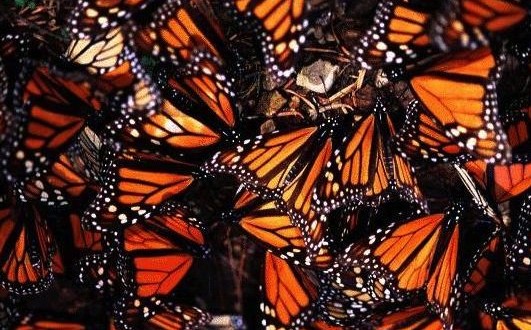The main cause of the monarch butterfly’s decline is the loss of milkweed — its food — in its U.S. breeding grounds, a new study has found. That all but confirms that the spread of genetically modified crops is indirectly killing the monarch.
The groundbreaking study was published today in the Journal of Animal Ecology.
“Our work provides the first evidence that monarch butterfly numbers in eastern North America are most sensitive to changes in the availability of milkweed on breeding grounds, particularly in the Corn Belt region of the United States,” said Ryan Norris, a professor in Guelph’s Department of Integrative Biology.
He conducted the study with lead author and current Guelph post-doc Tyler Flockhart, as well as scientists from the Commonwealth Scientific and Industrial Research Organisation (Australia’s national science agency).
These results contradict the long-held belief that monarch butterflies are most vulnerable to disturbances on wintering grounds in Mexico. They also confirm suspicions that recent declines have actually been driven by breeding events.
During the winter months, monarch butterflies congregate in a small area at high densities in Mexico. Scientists thought factors on those wintering grounds, such as climate change or deforestation, were the greatest threat to the population.
That led to multiple Mexican presidential decrees to protect butterfly overwintering habitats and efforts to curb illegal deforestation.
“The protection of overwintering habitat has no doubt gone a long way towards conserving monarchs that breed throughout eastern North America. However, our results provide evidence that there is now another imminent threat,” said Flockhart.
Milkweed is the only group of plants that monarch caterpillars feed upon before they develop into butterflies. Industrial farming contributed to a 21-per-cent decline in milkweed plants between 1995 and 2013, and much of this loss occurred in the central breeding region, the study said.
More than 70 per cent of milkweed in this region is located in agricultural-intensive landscapes where genetically modified crops are increasing, as opposed to 16 per cent in conservation lands and 10 per cent in public areas such as roadways, the study said.
Changes in milkweed abundance can affect everything from larval competition for food to egg-laying in adults.
“The rapid loss of milkweed projected for this region, attributable to land cover changes and shifts in agricultural practices, is a very large concern,” said Flockhart. Left unchecked, milkweed loss will cause the monarch population to decline by at least another 14 per cent, the study said.
The researchers developed a model to predict effects of habitat loss on both breeding and wintering grounds and the effects of climate change. They aimed to explain the observed population decline and make predictions for the next 100 years.
Their results connect an increase in genetically modified, herbicide-resistant crops and the current population decline of monarch butterflies in eastern North America.
“Reducing the negative effects of milkweed loss in the breeding grounds should be the top conservation priority to slow or halt future population declines of the monarch in North America,” Flockhart said.
Norris added:“Planting milkweed in the south and central United States would provide the largest immediate benefit.”
Earlier pioneering studies from Norris’s research lab have tracked year-round migration patterns of this iconic species using chemical markers and have looked at how monarchs migrate to their Mexican wintering grounds.
Canadajournal/Press Releases

 Canada Journal – News of the World Articles and videos to bring you the biggest Canadian news stories from across the country every day
Canada Journal – News of the World Articles and videos to bring you the biggest Canadian news stories from across the country every day

